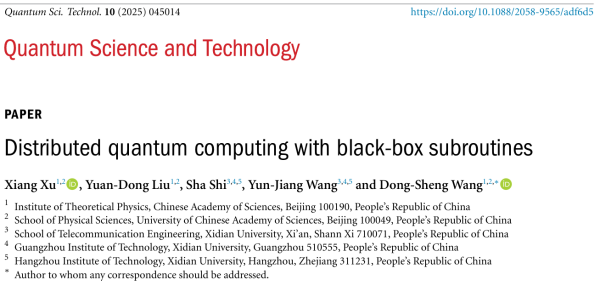Research Progress
Universal Control of Unknown Quantum Processes and Distributed Quantum Computing
Given an unknown quantum state or quantum process, is it possible to achieve its effective control? This question relates to the fundamental properties of quantum states and quantum information, as well as certain theoretical challenges in quantum computing. Recently, a team led by Associate Researcher Dongsheng Wang from the Institute of Theoretical Physics, together with collaborators, published a paper in Quantum Science and Technology—a leading journal in the field of quantum information. The paper proposes a distributed quantum computing method that enables universal control of unknown quantum processes.

The manipulation of unknown quantum states or processes is not only an important class of physical problems (e.g., the measurement of unknown parameters) but also crucial in computer science (e.g., the invocation of quantum programs). A well-known example is the no-cloning theorem in quantum mechanics, which states that an unknown quantum state cannot be precisely copied. Similarly, theoretical studies have proven that unknown quantum programs (i.e., quantum processes) cannot be read out (PRL 79, 321 (1997)) nor invoked (NJP 16, 093026 (2014)). Such limitations highlight the key differences between quantum information and classical information, and also pose profound challenges to the practical application of quantum information technology.
Inspired by quantum algorithms such as oblivious amplitude amplification, this study proposes mechanisms of oblivious quantum teleportation and oblivious quantum program control, which can overcome the aforementioned theoretical limitations. Unlike conventional quantum teleportation and control, the proposed mechanisms only require the implementation of relevant processes for physical observable quantities—different physical quantities can be realized using multiple copies of given quantum states or quantum programs. By integrating oblivious quantum teleportation and oblivious quantum control, a distributed quantum computing architecture can be constructed, enabling the readout and superposition of unknown quantum states, as well as the remote invocation, download, and upload of unknown quantum programs. This method can be applied to the integration of multiple quantum chips, increasing its scalability. Compared with conventional schemes (Comput. Sci. Rev. 57, 100747 (2025)), it offers a certain level of security, lower communication complexity, and reduced quantum circuit depth.

This research builds on recent progress in universal quantum computing models (Acta Phys. Sin. 73, 220302 (2024)). The unique properties of quantum states—such as superposition and entanglement—endow quantum technology with potential quantum advantages in solving certain problems; however, they also bring significant challenges, including decoherence and the large-scale precise manipulation of quantum systems. Universal quantum computing models are developed to address these challenges: they investigate quantum computing systems from a physical perspective, analyzing error correction mechanisms, control processes, and core quantum resources. The research team has proposed a classification table for universal quantum computing models, covering over a hundred distinct universal schemes. The distributed quantum computing scheme presented in this study was developed under the inspiration of this theoretical framework.
This work was supported by the National Natural Science Foundation of China (Grant Nos. 12447101, 12105343, and 62471368). It was conducted by graduate students Xiang Xu and Yuandong Liu from the Institute of Theoretical Physics under the supervision of their advisor, Dongsheng Wang (corresponding author). Collaborators include the research group led by Professor Yunjiang Wang from Xidian University. The study also received support from relevant funding agencies in Guangdong Province and Shaanxi Province.
